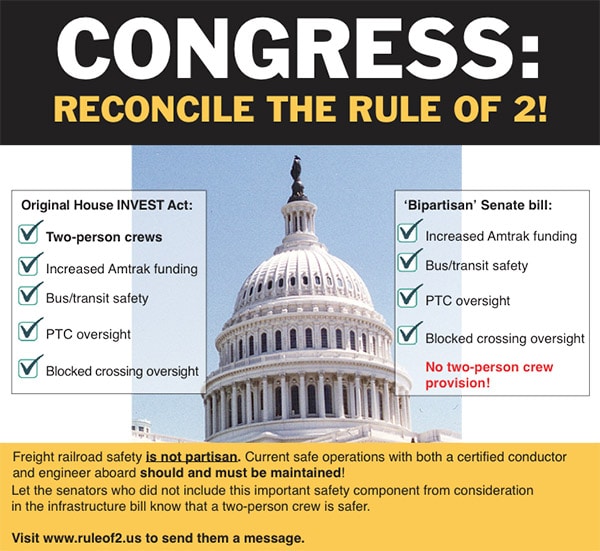SMART-TD Kentucky State Legislative Board | CSX & Norfolk Southern
The push for safer railroads in Kentucky has rolled out with the introduction of legislation requiring two-person freight train crews in both chambers of the state Legislature. SMART-TD Kentucky State Legislative Director (SLD) Jeff Mitchell’s crucial bill is gaining broad bipartisan support. Mitchell and SMART-TD urge all Kentucky members to contact their legislators and express their support for House Bill 33 (HB 33) and Senate Bill 47 (SB 47).
FOLLOW THIS LINK to send a message to your representatives in Frankfort. You can choose from a prewritten letter or write your own. Do your part for rail safety in Kentucky and preserve safety and railroad jobs for generations to come.
“Kentucky legislators are not used to getting large amounts of support from organized labor. If we can flood their inboxes with messages letting them know how this affects us and the towns we roll through, it won’t be something they’re going to forget,” said Mitchell. HB 33 already has been scheduled for a hearing in the House Transportation Committee in early March, so it’s urgent to show our support for this critical bill.
HB 33 and SB 47 have garnered strong backing from both sides of the aisle.The House version has broad support; lead sponsor Kevin Bratcher (R) is joined by three fellow Republicans as well as three Democrats. Sens. Greg Elkins (R-28th Dist.) and Robin Webb (D-18th Dist.) are sponsoring the bill in the Senate.
“When my legislative board and I began this process, we decided early on that we needed to keep party and politics out of this issue,” says Brother Mitchell. “We found partners in Frankfort on both sides of the aisle who could understand our members’ concerns and wanted to do right by them. Having a D or an R behind their name didn’t dictate whether they could picture coming around a curve on the side of a mountain with three miles of mixed freight pushing them, or if they thought having a second pair of eyes in the cab with a different angle of the signal was a safety feature worth keeping.”
Kentucky is the newest battleground in the larger war for mandatory two-person crews. As of right now, our union is staying on the offensive. In 2024 alone, SMART-TD has already seen two states progress with 2PC legislation. Kentucky’s bill is being heard in committee this week, and Virginia’s 2-PC bill has passed through both chambers and is awaiting signature by that state’s governor.
Please be part of this momentum by sending your message to your state senator and your state house representative.






